Chile belongs to the Pacific Ring of Fire just like Japan, and has many disasters such as earthquakes, tsunami and volcanic eruptions.
For this reason, there has been a long history of cooperation in the field of disaster risk reduction.
However today both countries are also sharing DRR policies and expertise with other Latin American countries.

Project Name
Disaster Risk Reduction Training Program for Latin America and the Caribbean (KIZUNA Project)
March 2015 - March 2020
Institutional Strengthening of ONEMI for Capacity Development in Disaster Risk Reduction Project
October 2018 - June 2021
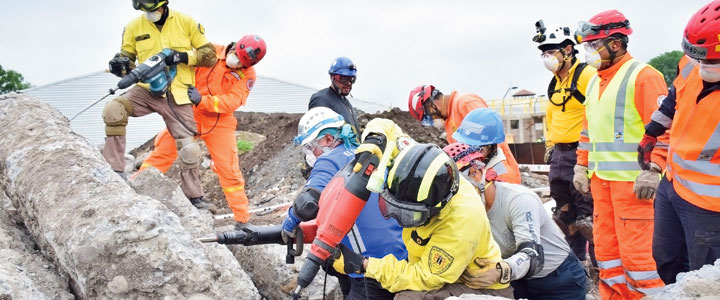
"Act quickly and safely!"
Conducting a rescue drill in a collapsed building as part of an "urban emergency rescue technique training course".
More than 30 years of cooperation
Cooperation between Japan and Chile in the field of disaster risk reduction began in 1960. This started with cooperation on the construction of civil engineering structures such as bridges and embankments, and the seismic enhancement of buildings, and in the 2000s it involved the formulation of a national land plan with a DRR perspective. Aside from this, cooperation was also provided in the enhancement of earthquake and crustal movement observation systems and in training on earthquake engineering and disaster prevention and mitigation, improving Chile's DRR capacity. However, the Central Chile Earthquake in 2010 that killed more than 500 people and caused significant economic damage reaffirmed to many people the need for strong DRR capabilities. Japan has cooperated in various fields, providing international emergency assistance and dispatching survey teams, providing continuing support for the strengthening of response capabilities for earthquakes and tsunami, conducting joint research on tsunami disaster prevention and conducting a mental health care development project in conjunction with Hyogo Prefecture, etc.
Development of human resources in Latin America
INOUE Hiromu of JICA says that "The KIZUNA Project was the culmination of these many years of cooperation, realizing Chile as a base for the training of human resources for disaster prevention in Latin America." Under this project, "Expert training" was conducted for Chilean researchers to learn necessary knowledge about disaster prevention, "Administrator training" was conducted for Latin American government officials to receive training on seismic design and emergency rescue, forest fire measures and mental health care, etc., and "network construction and enhancement" was carried out for participating people and organizations to be able to share knowledge and cooperate.
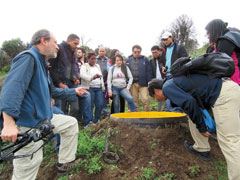
"Visiting the actual site teaches us a lot of things"
Participants of the Seismology Diploma course executed by University of Chile visiting a seismograph
Mr. Inoue explained the cooperation between the two countries, saying that "for the government official training, Chile's knowledge, experience and human resources were utilized and experts were also dispatched from Japan. urban rescue training was carried out with members of the Chile Fire Academy and experts dispatched from the Japanese Fire and Disaster Management Agency and Nagoya and Tokyo Fire Departments. Because of the past cooperation it went smoothly."
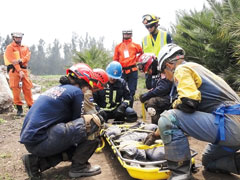
Japanese firefighters cooperating in lifesaving training.
Through the Project, 5,169 experts and participants have been trained from Latin America and the Caribbean . After they returned home they worked on DRR measures in each country. In Peru, returned trainees have taken the lead in formulating a business continuity plan to prepare for the risk of natural disasters at ports and have held a DRR seminar inviting a Chilean university professor who lectured at the KIZUNA Project. "This is just an example of the continuous use of this training network," Mr. Inoue says of the results. Victor Orellana, who was the Former Deputy National Director of ONEMI at the time, and responsible for disaster prevention in Chile, spoke about the meaning of this network. "Natural disasters occur regardless of national borders. In the future, I think that the ex-participants of the KIZUNA Project will take DRR measures from the perspective of the entire Latin American region. If a disaster occurs, we can help each other both in both the emergency response phase and the recovery and reconstruction phase, since we have already developed a relationship of trust."
Chilean National Office for Emergency of the Ministry of the Interior (ONEMI) Former Deputy National Director/Disaster Risk Reduction Consultant Mr. Victor Orellana
"I have been involved in cooperation between Japan and Chile in the field of DRR for nearly 10 years. The most important aspect of the KIZUNA Project is ‘the bonds between people'. The DRR system in Chile has been strengthened, but with populations concentrating in cities, the unprecedented risks are rising. We will continue to work with Japan to prepare for future disasters."
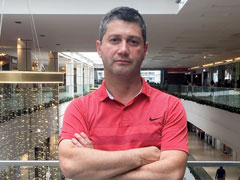
Mr. Victor Orellana
Strengthening local DRR capabilities
The ONEMI Organizational Enhancement Project was also conducted at the same time. At the request of Chile to enhance the formulation of local DRR plans and to promote DRR investment based on those plans, a JICA team worked together with ONEMI to develop materials for formulating local DRR plans and video materials for mayors and local government officials.
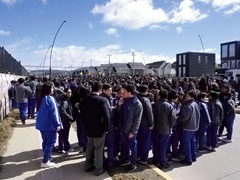
ONEMI also took the lead in conducting evacuation drills. The police and city hall also participated in training at a high school in Punta Arenas.
Mr. KOBAYASHI Ichiro of Oriental Consultants Global Co., Ltd., who were entrusted with the project by JICA, says about the results of training in Japan with Key members of ONEMI and local government officials, "In Japan the concepts of DRR planning are unified from central to local government levels, and knowing that investment is based on these plans has also led the Chilean government to move to formulate DRR plans." Despite the impact of the current COVID-19 pandemic, they are working to promote the introduction of Japanese expertise in disaster prevention information. Mr. Kobayashi expects that "by sharing disaster prevention knowledge between the two countries society will be safer and more secure and other exchanges between the two countries will be encouraged."
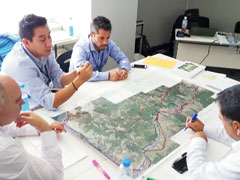
"We are taking necessary measures using disaster risk reduction maps"
ONEMI staff conducting local DRR plan formulation exercises.
Oriental Consultants Global Senior Director
Mr. KOBAYASHI Ichiro
"We are currently planning to monitor the activities of a pilot DRR project implementation in a pilot city. We will continue to cooperate for another year, towards the formulation of a local DRR plan that can actually be implemented."
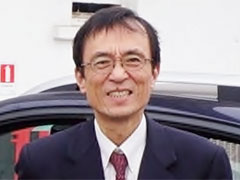
Mr. KOBAYASHI Ichiro




scroll